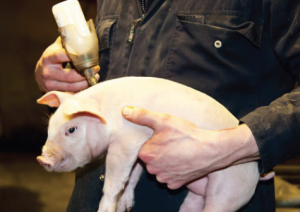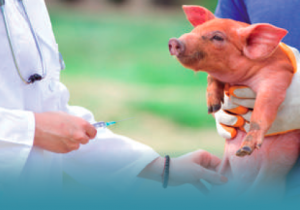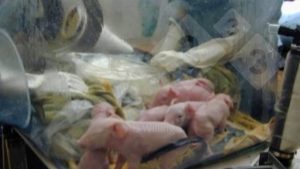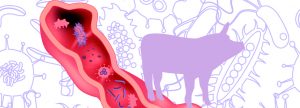 15 Jul 2022
15 Jul 2022
Gut microbiota which stimulates pigs’ immune response to vaccines, can also stimulate growth performance.
Introduction
As with COVID-19, one of the best ways to protect pigs from disease is through vaccination. However, as with COVID-19 vaccines, pig vaccines are not 100% effective in generating a protective immune response in all vaccinated animals. Which makes some vaccinated animals still susceptible to disease. It has been found that even within farms with a high health status, vaccine-specific antibody titers can vary by more than 100 times between animals of the same age and weight (Munyaka et al. 2019).

With the aim of finding ways to increase vaccine efficacy, various research groups are trying to understand why there is such variability in vaccine response amongst animals. These groups are also exploring gene expression within the blood, as well as the presence of microbes found in the gastrointestinal tract (gut microbiota) which could explain such variation.
 Study
Study
A study carried out in two different pig farms in Canada and France, showed that the determination microbial populations through fecal samples offered a more accurate prediction regarding individual pig responses to vaccines, compared to the gene expression of the blood’s immune cell population at the time of vaccination (Munyaka et al. 2019, Munyaka et al. 2020).
Finding trends amongst microbiota composition
While the microbial communities (gut microbiota) in Canadian and French pigs were very different, common microbes were seen to be associated with higher antibody titers (considered favorable) and low antibody titers (considered harmful). Some of the microbes linked to lower antibody responses were not surprising. As was the case of Clostridium perfringens, which is recognized as common cause of swine enteritis. Prevotella was the bacterial genus most associated with increased antibody titers both in Canadian and French pigs. This positive correlation was not found for all Prevotella species, but the vast majority was related to better antibody production. If Prevotella is actually causing a better immune response or whether its increased presence is an indicator of pig health is still to be determined.
Human studies vs animal studies regarding microbiota composition and its health implications
There are human studies that also suggest that a higher load of Prevotella promotes an appropriate immune response. For example, elevated levels of Prevotella during pregnancy were associated with allergy protection in offspring (Vuillermin et al. 2020). It necessary for future studies to focus on the role that Prevotella could have in pigs’ immune system development. Such a task should begin with the isolation of this strictly anaerobic organism, since very few Prevotella have been isolated in pigs. Currently, some isolates using anaerobic culture techniques have been obtained. However, it is still necessary to analyze how these may modify the immune response. This can be achieved with controlled microbial exposure and colonization of pigs raised within germ-free bubbles.
Figure 1. Production of germ-free pigs
Results
One of the key findings beyond the specific gut microbiota associated with vaccine response was in regards to the timing. While the bacterial community at the time of vaccination predicted antibody titers several weeks after vaccination, the bacterial community that coincided with the timing of antibody titers was no longer predictive (Munyaka et al. 2020).
This suggests that the bacterial community at an early age plays a fundamental role in pig development (Marcolla et al. 2019).
One last important finding from this study has helped to clear out certain misconceptions. Before the finding from this study, many researchers suggested that that those individuals who presented stronger immune responses could be spending greater amounts of energy generating antibodies. Which would in turn result in reduced growth rates for such individuals.

However, findings for the aforementioned study determined otherwise. Considering the fact that those microbes that had a positive correlation with higher antibody titers were also positively associated with growth performance.
Conclusions
The obtained results from the previous study, appear as very promising findings. As now that the role of these microbes in stimulating the immune response and performance has been established with greater clarity, the next task will be to figure out how they can be put to work. Future studies are therefore very necessary to confirm such positive correlations, and to find the best possible ways in which the potential of these microbes can be fully unlocked to achieve optimal health levels and higher productive performance in pigs.

Source:”Microbiota and the Positive and Negative Associations with Production and Health” Ben Willing
Subscribe now to the technical magazine of animal nutrition
AUTHORS

Nutritional Interventions to Improve Fertility in Male Broiler Breeders
Edgar Oviedo
The Use of Organic Acids in Poultry: A Natural Path to Health and Productivity
M. Naeem
Synergistic Benefits of Prebiotics and Probiotics in Poultry, Swine, and Cattle
Gustavo Adolfo Quintana-Ospina
Hybrid Rye Potential in Laying Hen Feed Rations
Gwendolyn Jones
A day in the life of phosphorus in pigs: Part I
Rafael Duran Giménez-Rico
Use of enzymes in diets for ruminants
Braulio de la Calle Campos
Minerals and Hoof Health in the Pregnant Sow
Juan Gabriel Espino
Impact of Oxidized Fats on Swine Reproduction and Offspring
Maria Alejandra Perez Alvarado